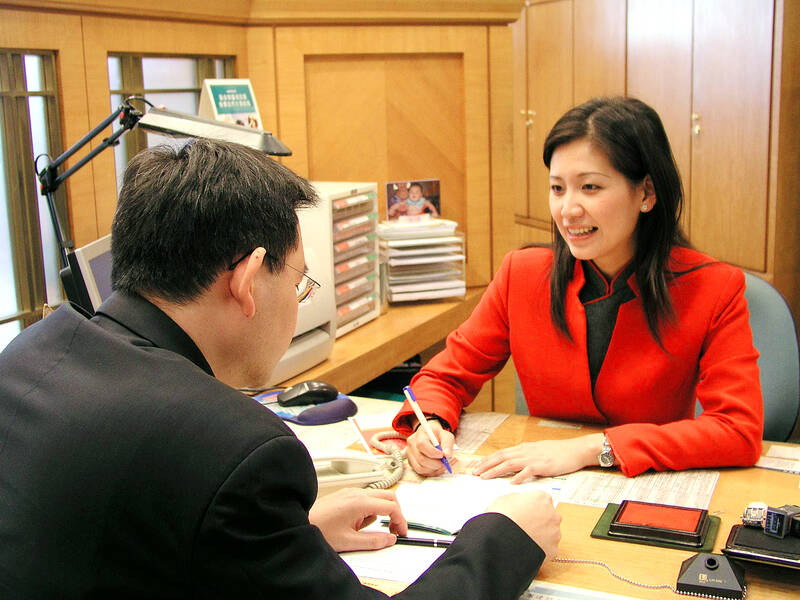Nearly 80 percent of Taiwan’s ultra-high-net-worth individuals (UHNWIs) are looking at wealth gains this year, with real-estate investment most likely to win their attention and inflation topping their list of risks, a survey by property consultancy REPro Knight Frank Taiwan showed yesterday.
The findings made super-rich Taiwanese more optimistic than their global peers, only 68 percent of whom are upbeat about wealth increase, research director Howard Zhan (詹宗煌) told a news conference in Taipei, defining UHNWIs as people with investable assets in excess of US$30 million.
Despite the financial turmoil and economic headwinds, 40 percent of super-rich people worldwide last year saw their assets increase, with 17 percent posting gains of more than 10 percent, Zhan said.

Photo: Lee Chin-hui, Taipei Times
That meant the remaining 60 percent saw their assets contract.
Taiwan’s UHNWIs fared worse last year, with only 26 percent seeing their wealth increase and 74 percent suffering losses, the survey showed.
Asked about risks ahead, 67 percent of the world’s super-rich named inflation as the biggest downside risk, followed by interest rate hikes at 59 percent, geopolitical tensions at 53 percent and recession at 13 percent, Zhan said.
As for opportunities, 46 percent of global UHNWIs favored investing in real estate, followed by technology businesses at 33 percent, equity markets at 28 percent and fixed-income products at 15 percent, the survey showed.
Real estate is the most favored option, because of its resilience to inflation, Zhan said.
Taiwan’s very wealthy people lag behind their regional and global peers in terms of real-estate investment appetite, with only 13 percent saying they intend to buy residential properties this year, compared with 16 percent for the Asia-Pacific area and 15 percent globally, Zhan said.
Taiwan’s UHNWIs own an average of 2.9 houses, compared with an average of 4.9 houses among their regional peers and 4.2 houses globally, the survey found.
In addition, 40 percent of the super-rich in Taiwan prefer owning real-estate properties overseas, higher than 26 percent among their peers in the region and 28 percent globally, it said.
Japan is the most popular target at 58 percent, followed by the US at 47 percent, Canada at 37 percent and Australia at 21 percent, the survey showed, adding that Singapore, Vietnam and the UK also rank high with more than 10 percent.
REPro Knight Frank Taiwan general manager Cliff So (蘇銳強) said that the ban on transfers of presale house contracts would make developers more cautious about launching new products and slow overall residential property transactions.
Demand for factory and office buildings would remain strong as companies shift production bases back to Taiwan, So said.

South Korea’s equity benchmark yesterday crossed a new milestone just a month after surpassing the once-unthinkable 5,000 mark as surging global memory demand powers the country’s biggest chipmakers. The KOSPI advanced as much as 2.6 percent to a record 6,123, with Samsung Electronics Co and SK Hynix Inc each gaining more than 2 percent. With the benchmark now up 45 percent this year, South Korea’s stock market capitalization has also moved past France’s, following last month’s overtaking of Germany’s. Long overlooked by foreign funds, despite being undervalued, South Korean stocks have now emerged as clear winners in the global market. The so-called “artificial intelligence

NEW IDENTITY: Known for its software, India has expanded into hardware, with its semiconductor industry growing from US$38bn in 2023 to US$45bn to US$50bn India on Saturday inaugurated its first semiconductor assembly and test facility, a milestone in the government’s push to reduce dependence on foreign chipmakers and stake a claim in a sector dominated by China. Indian Prime Minister Narendra Modi opened US firm Micron Technology Inc’s semiconductor assembly, test and packaging unit in his home state of Gujarat, hailing the “dawn of a new era” for India’s technology ambitions. “When young Indians look back in the future, they will see this decade as the turning point in our tech future,” Modi told the event, which was broadcast on his YouTube channel. The plant would convert

‘SEISMIC SHIFT’: The researcher forecast there would be about 1.1 billion mobile shipments this year, down from 1.26 billion the prior year and erasing years of gains The global smartphone market is expected to contract 12.9 percent this year due to the unprecedented memorychip shortage, marking “a crisis like no other,” researcher International Data Corp (IDC) said. The new forecast, a dramatic revision down from earlier estimates, gives the latest accounting of the ongoing memory crunch that is affecting every corner of the electronics industry. The demand for advanced memory to power artificial intelligence (AI) tasks has drained global supply until well into next year and jeopardizes the business model of many smartphone makers. IDC forecast about 1.1 billion mobile shipments this year, down from 1.26 billion the prior

People stand in a Pokemon store in Tokyo on Thursday. One of the world highest-grossing franchises is celebrated its 30th anniversary yesterday.